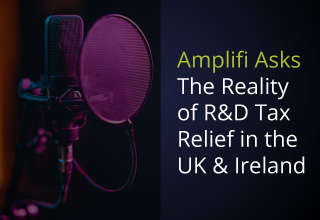R&D tax credit specialist Amplifi Solutions has grown its team a year on from launching in Scotland. Roger Daynes is their new Regional Manager for Scotland, bringing experience from an international career in technology, sales, marketing and growth, working in leadership teams at organisations including AEGON, Zurich and Nasdaq-listed Copart. Daynes will work alongside Amplifi’s Commercial Director, Jamie Watts, who joined Amplifi from Scottish tech recruitment firm iMultiply in June 2019.
Amplifi Solutions was co-founded by Jeff Drennan and Chris Maylin in Belfast in 2014, but with the Scotland office growing quickly over the last twelve months, around half of all Amplifi’s new clients are now headquartered here. Amplifi’s client base in Scotland includes venture capital-backed startups QikServe, the hospitality sector app which enables touch ordering and payment; identity and access management platform Symphonic Software, and Aberdeen-headquartered clean energy technology group East Coast Oil & Gas.
Jeff Drennan, Managing Director and Co-Founder of Amplifi Solutions, said: “We’re excited to grow the team in Scotland, a country whose entrepreneurs continue to build a global reputation for innovation, tech know-how and are creating some leading technology companies. Most of these businesses are in the SME sector and are innovating every day, which means they have the most to benefit from the R&D tax credit incentive.”
Drennan added: “Getting Roger on board, in addition to Jamie joining the senior team last year, gives us a wealth of advisory talent at a time when government support has never been so high, nor so essential. For our new Scottish clients, we are highlighting areas of innovation within their business they didn’t even realise qualified, which is opening up a new R&D tax relief avenue for businesses of all sizes and sectors across the country.”
HMRC’s latest R&D Tax Credit statistics, published at the end of September, revealed that Scottish SMEs made over 2,405 claims equating to £135 million R&D tax credit funding in 2018/2019, with the overall figures for Scotland-based businesses as a whole at 2,925 claims equating to £235 million in R&D tax credit funding. In the UK as a whole, £5.3 billion of R&D tax relief support was claimed in 2018/19 equating to £35.3 billion of R&D expenditure.
Roger Daynes, Regional Manager for Scotland at Amplifi Solutions, said: “Being part of the Scottish diaspora in North America and the Middle East allowed me to see how highly rated the nation is when it comes to all things tech. At Amplifi Solutions, I now have the chance to work with many of our most dynamic businesses and help them to harness their growth aspirations and potential.”
Private equity firm Maven Capital Partners is one of Amplifi’s advocates, with Maven’s Investment Director, Alan Robertson, adding: “At a time when businesses are being tested by a number of external factors, it has never been more important for them to continue to innovate. A number of Maven investee businesses conduct high levels of ongoing R&D as part of their day-to-day operations and it is encouraging that they are able to get support for this important investment by making use of the R&D tax credit incentive.”






